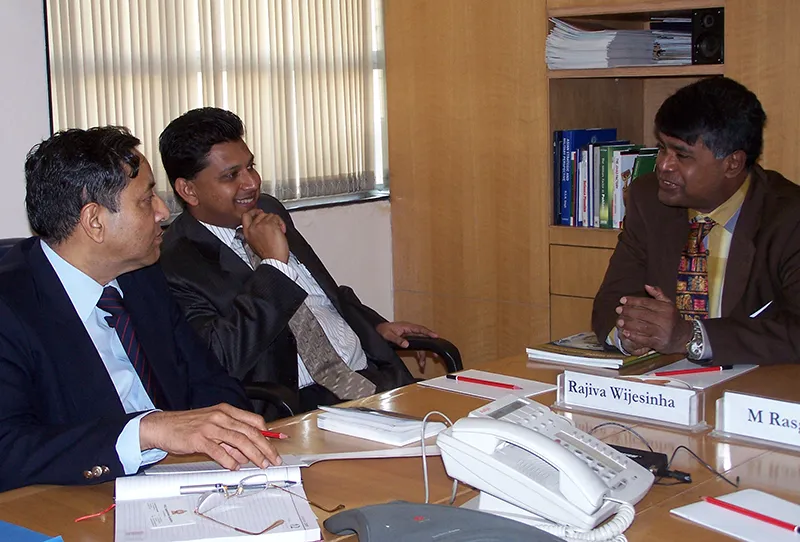The full-fledged effort to resettle began last September which got stuck mainly because of the suspicions raised by the security forces regarding the presence of the LTTE sympathisers among the IDPs

Sri Lankan Permanent Secretary Ministry of Disaster Management and Human Rights Prof. Rajiva Wijesinha Rights said that the return of Internally Displaced Persons (IDPs) to their native places was a challenging task as it faces three “constraints” including that of de-mining of the region.
Delivering a talk on “Returns, Rehabilitation and Reconciliation in post-conflict Sri Lanka” at the ORF campus on Thursday, February 11, 2010, Prof Wijesinha touched upon all the three ‘Rs’ and accepted that the foremost question before Sri Lanka today is to secure the welfare of nearly 2,80,000 people who suffered most during the Eelam war IV.
However, the ‘Return’ of the IDPs to their native places has three constraints, the Secretary said and added that the landmines need to be de-mined before the people could be resettled in their original habitations. Secondly, there is infrastructure deficit. Everything has been reduced to rubble. Some basic requirements need to be put in place so that the people could start their livelihoods in these places. Third is the security-related problem as there is a fear that LTTE sympathizers may still be there among 2, 80,000 people languishing in refugee camps, Prof Wijesinha pointed out.
The full-fledged effort to resettle began last September which got stuck mainly because of the suspicions raised by the security forces regarding the presence of the LTTE sympathizers among the IDPs. Despite these suspicions, almost 1, 80,000 IDPs returned to their native places. With the presidential elections over, Prof. Wijesinha hoped to finish the entire process by the end of March 2010. It can thus be said without doubt that resettlement programme is progressing well. The Government of Sri Lanka is also organizing a number of welfare programmes for the benefit of the people of the war-ravaged North.
The visiting Sri Lankan Secretary appeared less enthusiastic on the question related to the ‘Rehabilitation’ of nearly 11000 former LTTE cadres in the mainstream. While explaining the rehabilitation process in some detail, Prof. Wijesinha accepted that though the process is slow because of the genuine security concerns, the government has divided them into two sets – one set includes those who are in detention for quite a long time and under second set comes those who have recently been put in the rehabilitation centres. These two sets of people were again divided into 7 categories ranging from the hard core rebels facing serious charges to the people with minimal involvement but who nevertheless, needs counseling before their release.
Referring to the international role, Prof. Wijesinha was critical of the complicity between the international organizations and the rebel LTTE and pointed out to an incident in which the UNICEF gave the LTTE a million dollar aid in 2002-03 for which no account exist yet in Sri Lanka. This has proved that some of these organizations were dealing directly with the now-defunct LTTE, he asserted.
The mood at the moment, Prof Wijesinha said, is to finish resettlement process as soon as possible. Showing photographs of prosperity returning to the Northern Sri Lanka, Prof. Wijeisnha also dwelt at length on the constructive role played by the Sri Lankan security forces in bringing the life back on tracks in these areas.
Praising Sri Lankan armed forces, the Secretary said the record of the security forces during the entire conflict was better then compared with any other armed forces in the world in a similar situation. In 2006-07, there was not even a single criminal incident involving Sri Lankan Army, he claimed. Some of the incidents reported in international media that have shown Sri Lankan army in a bad light were later found to be forged.
On the question of ‘Reconciliation’, he said there are some areas that need an urgent attention. Firstly, it is very important for the people of the country and elsewhere to know that the work is being done for the welfare of those who suffered during the civil war. Secondly, infrastructural development is the need of the hour and thirdly, involvement of the local people in developmental tasks is required to give them the sense of belonging to the nation. In fact, it is heartening to note that the public servants who earlier worked under the LTTE have been happily working under the government-sponsored programmes.
Taking the discussion further, he told the audience that it is a positive sign that during the presidential elections, both the candidates appealed for minority votes. Reconciliation demands regional autonomy but it is not possible without empowering the periphery at the centre. Some powers have to be with the centre to ensure the state’s integrity, he said. Nevertheless, steps have been taken to recruit Tamils in Police and Army which is a pre-requisite for their re-induction into the mainstream Sri Lankan society. Apart from political reconciliation, connectivity is another important component in integrating the Tamil minority with the Sinhalese majority. Next important step is to promote education and state-sector employment among the masses to reduce the fissiparous tendencies among them. These are some of the ways which could help in making Sri Lanka plural.
The report has been prepared by Anjali Sharma, Associate Fellow, ORF
The views expressed above belong to the author(s). ORF research and analyses now available on Telegram! Click here to access our curated content — blogs, longforms and interviews.




 PREV
PREV

